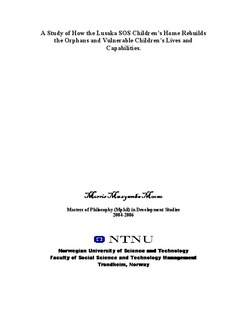A Study of How the Lusaka SOS Children’s Home Rebuilds the Orphans and Vulnerable Children’s Lives and Capabilities.
Master thesis
Permanent lenke
http://hdl.handle.net/11250/265272Utgivelsesdato
2006Metadata
Vis full innførselSamlinger
- Institutt for geografi [1108]
Sammendrag
The study examined how the Lusaka SOS Children’s Home (re)builds OVCs lives and capabilities using the capability approach, and the qualitative methodology. The latter brought me into physical contact with the key informants in order for me to listen to their plight. In this way, SOS seem to be contributing towards achieving Millennium Development Goals (which include achieving universal primary education and reducing infant mortality by 2015) by cutting hunger and poverty in half among OVCs. It was found that while families were best suited in raising children, SOS had done a lot in rebuilding and transforming the lives and capabilities of OVCs. The assistance included provision of decent shelter, medical facilities, education, food and protection from abuse. This assistance is a fulcrum in rebuilding capabilities for OVCs as children knew what they were capable of doing and achieving in their lives. SOS was able to help in instilling the self confidence while OVCs expressed happiness with the SOS intervention. They spoke for themselves on how poverty emanating from their own parentless status could be reduced. This shows that functionings (achievements) and capabilities vary through time and space (that is geographically) depending upon the intrinsic characteristics of the OVCs concerned, and the prevailing social costumes.
